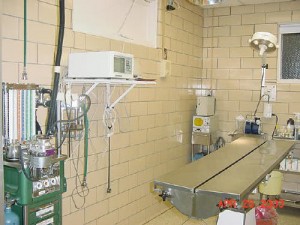

2814 East High Street
Sanatoga, PA 19464
610-326-6346


2814 East High Street
Sanatoga, PA 19464
610-326-6346
 After a thorough examination of your pet's illness, we may recommend if a surgical procedure is necessary. This is prescribed to help ensure that your pet leads a long and healthy life.
After a thorough examination of your pet's illness, we may recommend if a surgical procedure is necessary. This is prescribed to help ensure that your pet leads a long and healthy life.
We are proud to offer CO2 laser surgery as well as therapeutic laser treatments for pain relief. Laser technology promotes healing and allows your pet to recover more quickly.
To perform surgical procedures, we utilize anesthetic agents and pain relief. General anesthesia is administered using a variety of drugs. These drugs can be given by injection between the superficial layers of skin, into a muscle, or directly into the bloodstream. We also use inhalant anesthesia, specifically Isoflurane with oxygen.
During surgery, the anesthetized patient is monitored with ECG, pulse oximeter, and respiratory monitors.
We will provide you with specific instructions about feeding and watering your pet the day prior to surgery. Please inform our hospital staff if your pet was inadvertently fed or watered beyond the suggested times. Additional instructions will be given at the time of your pet's admission to our hospital. Our staff is always available to answer any last-minute questions you might have about the surgery.
Upon arriving at the hospital, ensure your pet is adequately restrained on a leash attached to an appropriately sized collar. Small dogs or cats can be transported in a suitable ventilated carrier.
After the surgery, we will provide you with a progress report and our findings. We will also give you instructions for your pet's post-surgical care.
Common surgical procedures performed at the hospital include:
A: You should follow the specific feeding and watering instructions provided by our staff, typically withholding food and water for a certain period before surgery. Notify us if your pet has eaten or drunk anything outside those guidelines to ensure safety during anesthesia.
A: We use a combination of injectable anesthetic drugs and inhalant anesthesia such as Isoflurane with oxygen. Your pet’s vital signs are closely monitored throughout surgery with ECG, pulse oximetry, and respiratory monitoring.
A: CO2 laser surgery uses focused light energy to make precise cuts. It reduces bleeding, swelling, and pain compared to traditional surgery, promoting faster healing and recovery for your pet.
A: After surgery, we provide a detailed progress report and personalized post-operative care instructions. Monitoring your pet for any signs of discomfort or complications is important, and our staff is available for any questions during recovery.
A: Our hospital commonly performs spays, neuters, bladder stone removal, fracture repair, eyelid surgeries (for conditions like entropion and ectropion), and tumor removals.